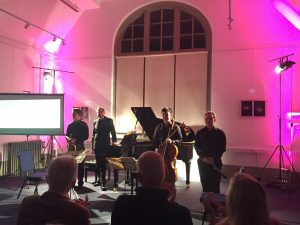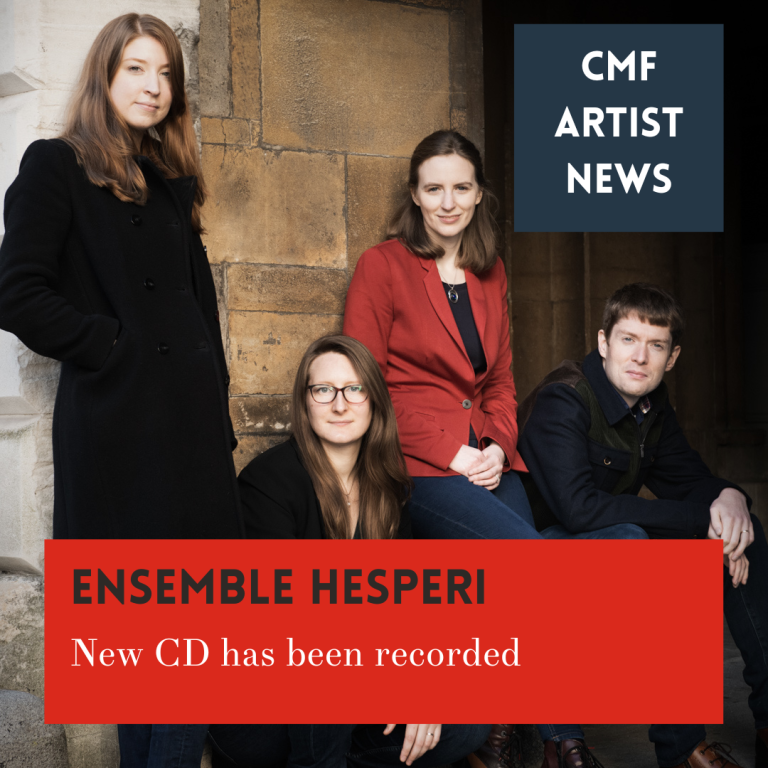City Music Foundation in March
Have a read of the latest upcoming events and news from the CMF Artists this month
Last night four CMF Artists produced an electrifying performance of Olivier Messiaen’s devastating Quatuor pour la fin du temps, ‘Quartet for the End of Time‘ at Clapham Omnibus. The quartet featured clarinetist Joseph Shiner, Michael Foyle and Maksim Štšura of the violin and piano duo the Foyle-Štšura Duo and cellist Yelian He of Y-Squared.
The performance was reviewed by Robert Hugill on his blog here who stated that “the four young performers gave us an account full of vitality, energy and intensity”.
Hugill drew upon several moments of the night declaring the performance hypnotic at times, with a ‘fine sense of dialogue’ and virtuosity. He noted how the four artists brought out the uneven rhythms of the 6th movement entitled Dance of fury, for the seven trumpets ‘in a way which was rather catchy and almost jazzy’.

Finally, Hugill praised Michael Foyle for the way in which he conducted himself in the final movement Praise to the immortality of Jesus, for violin and piano. For this movement, Michael performed with great control and a ‘sweet tone’ finishing the quartet in an exciting and unique way by walking through the audience whilst playing; a moment Hugill pronounced as ‘a nice touch’.
The recital was preceded by a 30-minute talk by pianist, Maksim Štšura covering the history of the piece and discussing certain moments of Messiaen’s own notes on the various movements which were later projected during the performance to illuminate certain aspects of the work for the audience.
A few particularly insightful moments of the talk stand out; for instance Maksim commented that the premiere of the piece has become distinctly mythologised, perhaps even by Messiaen himself. The story goes that the quartet was composed and performed in a prisoner of war camp – the camp described as a harrowing place – in which a solitary compassionate guard was said to have smuggled a few scruffy pencils and paper on which Messiaen wrote the piece in secret, hiding from any less friendly and suspicious guards. Subsequently the piece was said to have been first played outside in the freezing cold to 5,000 people giving a sense of the vast loneliness and a melancholy tone to the proceedings. However, this myth has been somewhat debunked through prisoner accounts now suggesting that the guard had the composer stationed in an empty barrack so that he could work undisturbed with another guard stood at the door to turn away intruders, and the premiere was in fact to a mere 300 people inside the barracks.
Another interesting story was that of the instruments and artists; legend has it that the piano used was ancient and broken with a missing key and the musicians themselves were said to be amateur. Although I rather like the impression of an uplifting underdog story of prisoners coming together to learn such a challenging work, unfortunately as much as we wish this was true, the music is far too advanced for amateurs and the musicians were in fact professionals and multi prize-winners; clarinetist Henri Akoka, violinist Jean le Boulaire and cellist Étienne Pasquier.
Nevertheless I think a bit of legend add a delicious mystic layer to the work adding to the sense of history and sadness to any performance. The four CMF Artists performed the piece brilliantly and managed to bring individuality and life to a truly unique and multi-faceted work.
Have a read of the latest upcoming events and news from the CMF Artists this month

Ensemble Hesperi have successfully crowdfunded for their second album, “A Gift for your Garden” and have now recorded it.
Please help us with a donation…
City Music Foundation
Church House
Cloth Fair
London EC1A 7JQ
Registered Charity No: 1148641
© City Music Foundation 2022 All rights reserved Site by DOT